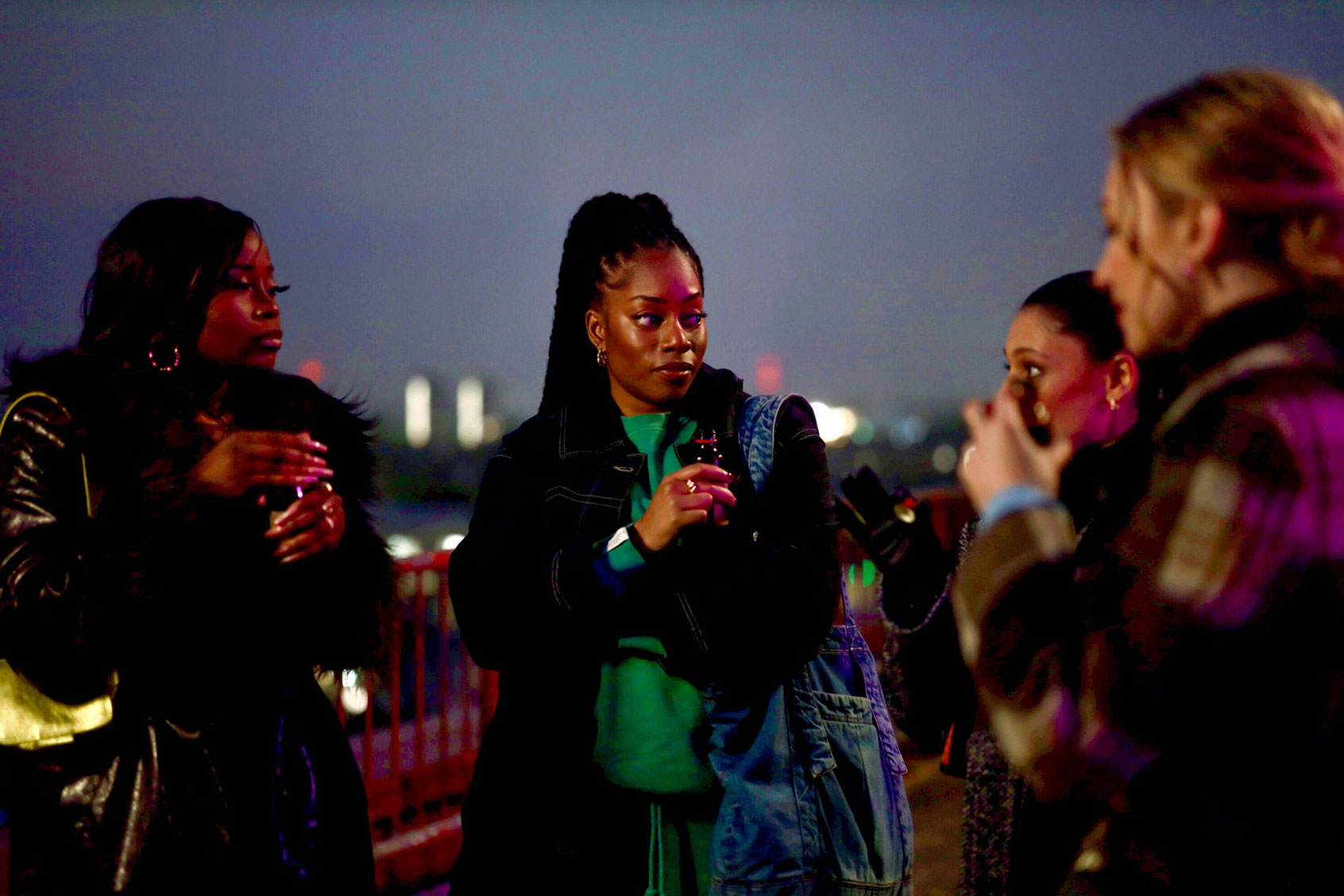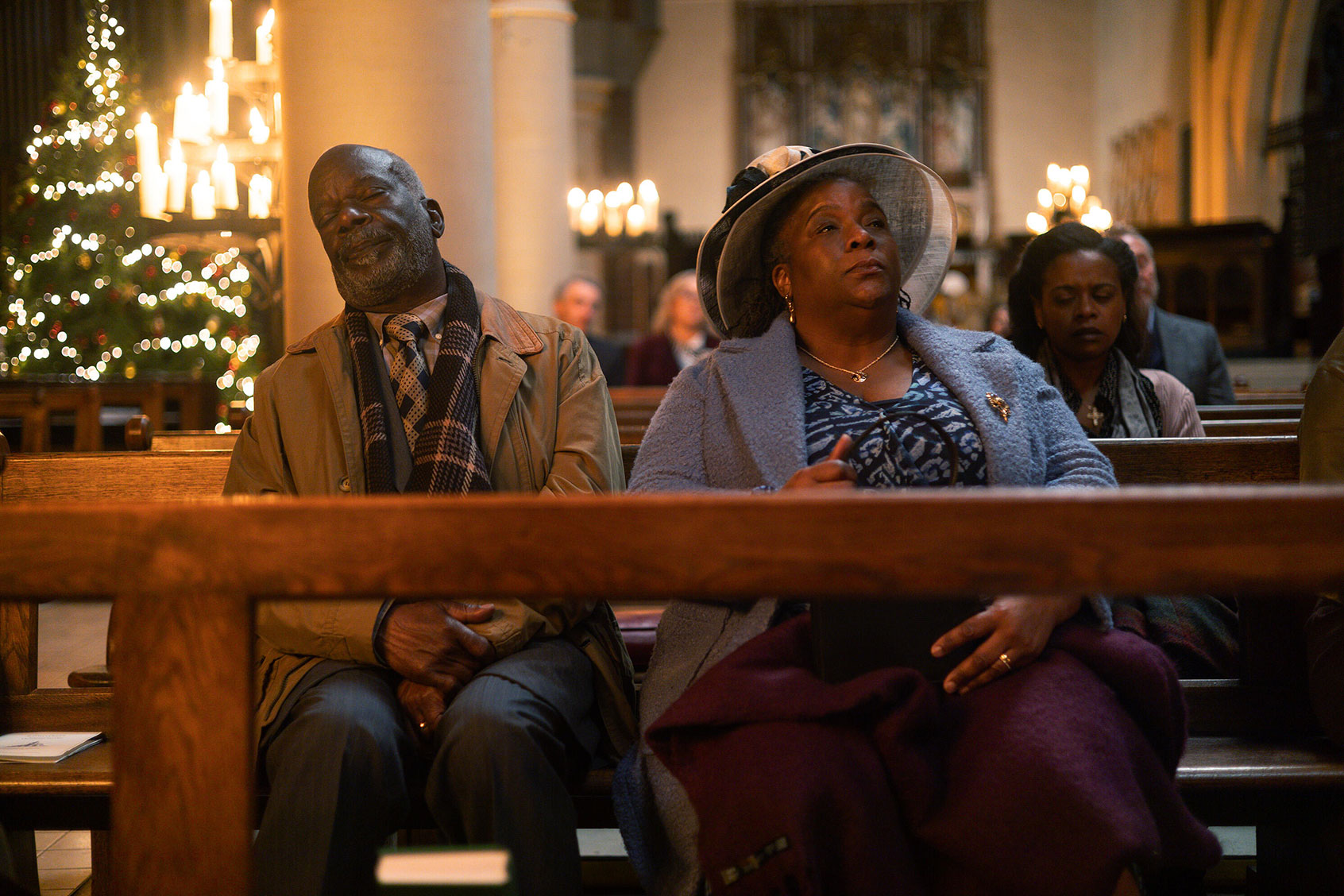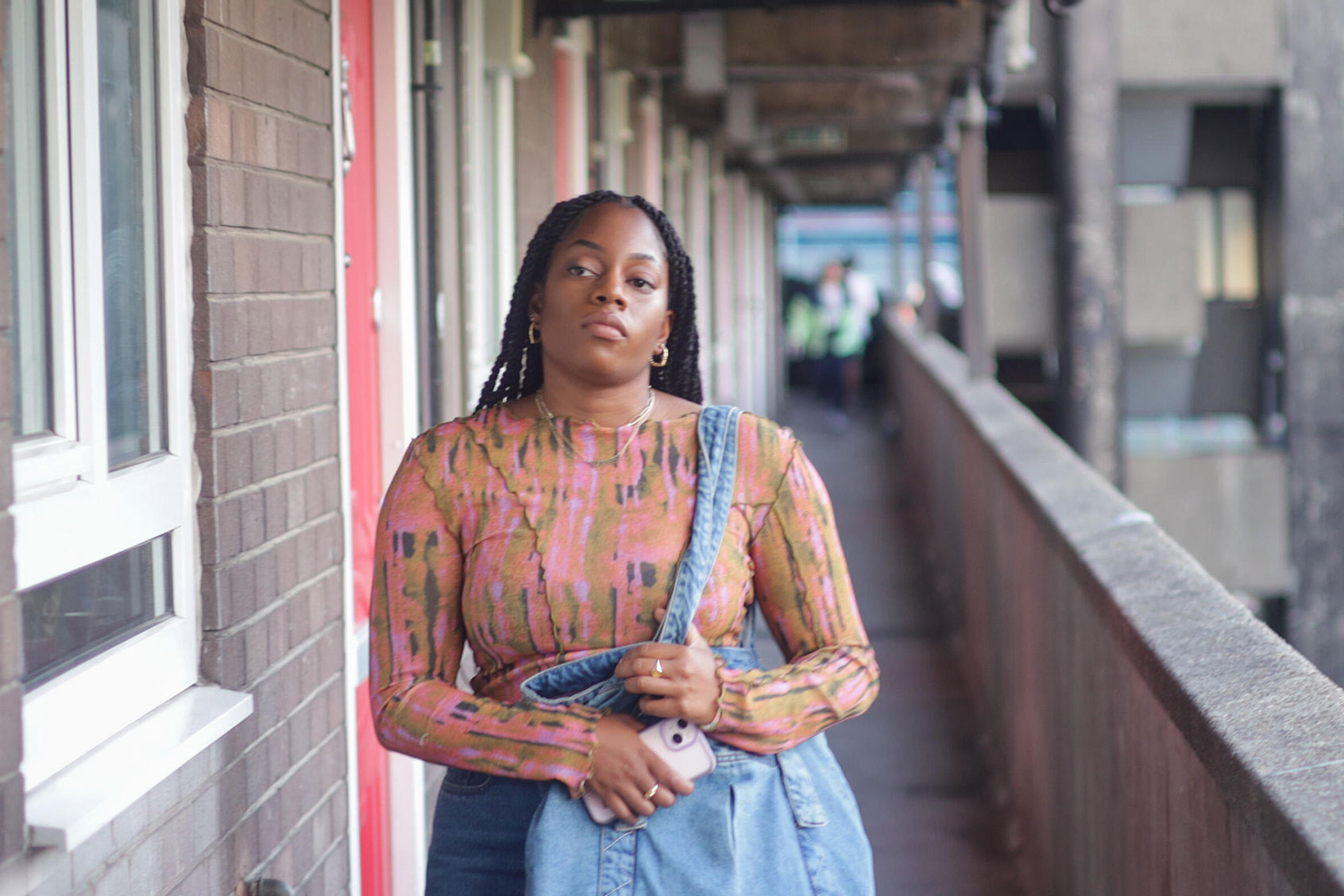Nobody has had as terrible a day, month or year as Queenie Jenkins. The 25-year-old British-Jamaican protagonist of Candice Carty-Williams' novel "Queenie," has jumped off the page and onto the television screen in Hulu's series adaptation of the same name.
Queenie (Dionne Brown) is a 20-something Black woman working as a social media intern trying to make it as a writer. Meanwhile, she has a complicated breakup with her long-term white boyfriend and is dealing with painful traumatic experiences in her immigrant Jamaican family, specifically her fraught relationship with her mom. Although she has the support of her best friend, Kyazike (R&B singer Bellah), the conflicts in Queenie's life come to a head as she deals with the damaging fallout of her breakup and not feeling understood or heard at her predominantly white workplace. Queenie struggles to hold it all together like she thinks she should, but she is a gaping, bleeding wound of raw emotion.
"I think that in so many ways, we're all trying our best as Black women."
"Since I could remember I've always been told to be strong. I've always been told that I can handle everything," Carty-Williams, who is also a showrunner and executive producer on "Queenie," told me in an interview. "When I was in my 20s, it all fell apart. And that's why I was able to write this character because I know what it feels like. And I'm really bored of the idea that Black women need to be strong and handle everything because like, who is a healer to us?"
Carty-Williams also said she wanted to Queenie to emulate lead characters who narrate their journeys like Carrie Bradshaw and Fleabag. "I've seen it but not enough," she said. "And to spotlight a Black British woman, that's who I am also."
Check out the rest of my conversation with Carty-Williams and stars Dionne Brown and Bellah.
The following transcript has been lightly edited for length and clarity.
First, Candice. “Queenie” was a breakout novel for you. How was adapting your own words to the screen? Were there any difficulties with that transition?
Candice Carty-Williams: I would say the biggest difficulty is making sure that I was squeezing in everything the novel intuitively shows and making sure that every single character stays true to that character. You go from writing the novel and giving it to an editor to having 15 execs being like, "Would she say that?" and you having to be like, "Yes, she would actually say that." I'm protective in general so I was able to also protect my characters, protect my intentions and things I was saying. That was the most important thing for me in this process.
“Queenie” resembles shows like “Fleabag,” “High Fidelity,” “Sex and The City” where the main character narrates her life as she goes through some of the hardships of adulthood. What was it like creating this world where a Black 20something is at the forefront of the show and her own life?
Carty-Williams: It was important for me, is the main thing. I haven't seen it enough. I've seen it but not enough. And to spotlight a Black British woman, that's who I am also. So I'm going to do that and I'm going to enjoy doing that. Because as much as I'm not necessarily someone who wants to be front and center and seen, I believe that we still should be visible. And I think that you do have this as a Black woman, hyper-visibility/invisibility, that you're balancing all the time and you're in the middle of being like, "Who am I?" And so Queenie is someone who is like, "I'm here and I'm not perfect, but I exist and I'm trying my best." Doing that was easy because I think that in so many ways, we're all trying our best as Black women.
Dionne, how did this role come to you? And had you read the book before landing the role? Or is this something that just kind of perfectly fell into your lap?
Dionne Brown: I think it's a little bit of both. The book was on my list when I was in second year at drama school. I hadn't managed to get to it because at that time; my reading list was massive. And then I finished school and I still hadn't gotten around to it and I met Candice when I was auditioning for her last TV show which was "Champion." I didn't get it. Obviously, Déja [J. Bowens] got it.
Carty-Williams: Which is good! There's always a plan!
Brown: Yeah. I got it and yes, when the casting call opened for "Queenie." The team reached out to my agent and asked if I would tape, which I was obviously happy to do. I did and then went through, went through, went through and then we got it. So that's how it ended up coming to me. It was kind of an outlier of meeting Candice already for another project.
 Bellah and Dionne Brown in "Queenie" (Latoya Okuneye/Lionsgate)
Bellah and Dionne Brown in "Queenie" (Latoya Okuneye/Lionsgate)
Bellah, as an R&B artist, how did you make the transition to acting? Kyazike felt so lived-in to me – I felt like I saw so many of my friends in her: What was it like playing this best friend who is a pillar of strength and support?
Bellah: It was really fun. I like to believe that I am a pillar of strength and support for my friends, and if they say otherwise, they're lying! It was really nice to step in and be that for a Black woman. I feel like when we have our stuff, it's very important for us to recognize that if this is hurting you, if this upsets you, then it upsets me, and I'm going to be here with you in it. And it is as important as you think it is in your head and I'm not going to gaslight you like everybody else wants to do so. I really enjoyed just being a ride or die. I'm a support Black women's rights and wrongs type of woman!
Candice, as a Black female writer and journalist, what about that experience did you want viewers to see and feel?
"Who are you when you don't have the things that you thought would make you happy?"
Carty-Williams: I wanted to show someone who was trying to make a change. And Queenie is 25. She's gone into the newspaper [business]. . . and has a job as a social media assistant. And actually she wants to be talking about what's happening in the world. And like me, it's just always trying to get your voice heard and wanting to say like, "This is happening to us. Can we all notice it? Can we all care?" Queenie is doing that. We're the same in that way. Just being like, this is the voice that I have. I don't present anything that will be the front and center of it or we are stuck being the star. I just wanted to say look around, things are happening to us and they're important. I guess one of the biggest commonalities that me and Queenie have is using our voice for like it's a good enough way.
Dionne, as Queenie is dealing with some of the most difficult moments of her life like a miscarriage and a breakup, what were some of the challenges in playing such a dynamic character?
Brown: I think definitely having to self-regulate again after dipping back into the hard parts of my own life journey. Which is normal; we all go through hardship in our early 20s. But I think having to take the time to regain the time for myself again, just to come back to myself after going back to the hard time that I needed to go to empathize and sympathize with Queenie and try to portray that as best as I could for screen.
Queenie’s mental health is slowly unraveling on the show, and yet these struggles are so easily dismissed by people because she seems like such a strong character/person. What about the Strong Black Female character trope did you want to pick apart, Candice? And for you both, Dionne and Bellah, how did that feel getting to rework what that trope meant?
Carty-Williams: For me, this is something that I've been sick of. Since I could remember I've always been told to be strong. I've always been told that I can handle everything. And it got to a point where in 20s, and I was like, "What is everyone talking about? Is this actually real?" I was presenting as I was growing up because that's what I was told. I would always be the strongest person. I would always be first. I could carry everything. And then when I was in my 20s, it all fell apart. And that's why I was able to write this character because I know what it feels like. And I'm really bored of the idea that Black women need to be strong and handle everything because like who is a healer to us? Everyone is loved by someone.
Bellah: For Kyazike's character, I think there's something to be said that she's looking for a man who will take care of her financially. She's like, "I'm a pretty, pretty princess. And what are you going to tell me about that?" The only time I need to show off as strong is for my friend. Actually, no, lift me up from the cart and carry me to the destination. There's like a hyper-femininity about Kyazike. When she goes out she's got her heels, she got her nails, she got her hair done. And she's looking for something very specific, which is to be taken care of. And I love it because we all deserve it.
Brown: For me, it was quite exciting to gauge the trope of what it means to be a strong Black woman because we can see that Queenie is struggling with what she perceives that to be and how she's feeling which is the complete polar opposite. She doesn't feel strong when we start the book or the show. And we start to see her feel less and less so as it goes on. So I think it was rejiggering just the whole perception of being a strong Black woman. I leant into it really well because it's the duality of things of like being sensitive and being strong and being smart and not being super loud. What are the stereotypes of being a Black woman and what does it look like when you're not any of those things and how you're fitting into certain places that you've ascertained may not have necessarily been built for you or may not be super receptive to the way you naturally carry yourself or think or feel?
 Joseph Marcell and Llewella Gideon in "Queenie" (Latoya Okuneye/Lionsgate)
Joseph Marcell and Llewella Gideon in "Queenie" (Latoya Okuneye/Lionsgate)
The Black British experience is very singular and it is different with each ethnic background but I found some common ground with Queenie. What about her familial and Black experience did you all find was important to share with viewers who aren’t Black and British or one or the other?
Carty-Williams: I think her existence is politicized, but it shouldn't be because she's just going through it like everyone else and she's doing her best. And I guess where she's come from: she is a child of immigrants effectively. It is about what happens when you're just dropped into this place, and you're all just doing your best. So I think for me, it's always, yes, we're coming from different places, but we are still all just doing our best in an environment in a world that we've increasingly realized was not made for us and still doesn't support us and some doesn't love us the way it should. But, again, it's about putting one foot in front of the other sometimes.
Queenie’s mom, Sylvie (Ayesha Antoine) says a line that really stuck out to me: “Being brave isn't the same thing as being alright.” Why is it crucial to highlight Black women’s mental health struggles?
"Freedom is when you're able to be like, I am who I am."
Carty-Williams: Because I think that every person has mental health struggles, but I think that whether being strong you just end up putting those to the side and you can push all of that stuff out as much as you want, but it's always coming up. And this is about showing that you can push it down in any way, that you can drink, you can have sex . . . But it's all coming. It's all coming back. And you will need at some point to face up to it. And you know, as we all do, I think it's very real.
Ultimately, we see Queenie make peace within herself through therapy, healing her relationship with her mom and letting go of toxic behaviors in romantic relationships. What about her journey can inspire others?
Brown: Probably that it's just acceptance, accepting the things that could have been that weren't accepting the things that are as well and then move within it. It just comes back to like who are you when you don't have the things that you thought would make you happy? And now how do you find your happiness? I think that's just the journey that she's on now. It's like she's just trying to find happiness. She's not trying to draw it from too many places outside of herself. She's trying to see what she can give to herself now. That's what I hope people take from it like what can you give to yourself?
Bellah: I hope people see that hindsight is 20/20. The realization of, "Oh, maybe we should have communicated or maybe I shouldn't have done that this way." You can learn from that and also simultaneously, take the journey for yourself and learn on the way, and it's OK to be in a crazy situation and not be like I knew exactly how to get myself out of this situation. I hope they realize that a lot of people have more community than they think they do. And they reach out to more people after watching the show. Yeah, that they're not alone.
Carty-Williams: There was a line that Diana (Cristale De'Abreu) says in the final episode, she says to Queenie, "You've got to let go to be free." And that is something that I've for years just been like, we hold on to stuff so often. And I think that we just kind of need to be able to understand that freedom is when you're able to be like, I am who I am, and I can only be who I am rather than holding on to these ideals of who we should be that are put onto us. So I remember that all the time. I think about that all the time and myself.
"Queenie" is available for streaming on Hulu, premiering on Friday, June 7.
Read more
about this topic


